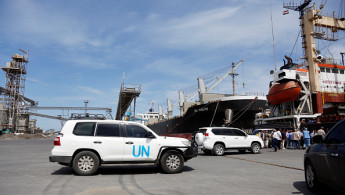UN official kidnapped by Al-Qaeda in Yemen free after 18 months in captivity
A UN worker kidnapped by Al-Qaeda in Yemen was released after year and a half in captivity, local media reported Thursday.
Akam Sofyol Anam, a Bangladeshi national, was a field coordination officer of the UN Department of Security and Safety in Aden when he was abducted in February last year, along with four other UN employees. Their car was intercepted as they returned to Aden following a field mission, and they were taken to an unknown location.
Anam arrived in the Bangladeshi capital Dhaka on Wednesday evening, the Dhaka Tribune said. Anam returned to his home country via Abu Dhabi.
#BREAKING
— South24 | English (@South24E) August 9, 2023
Bangladeshi media: The UN official, AKM Sufiul Anam, who was kidnapped by #AQAP in #Abyan 16 months ago, returned to Dhaka on Wednesday, from the #UAE.#south24 pic.twitter.com/HlykKFU0zj
Images and videos of Anam as he landed at Hazrat Shahjalal International Airport, where he could be seen greeted by the media and loved ones, were also released.
"I never imagined in my life that I would be able to return to the country," he said during a press briefing upon arrival.
"We have gone through indescribable days. The fear of death haunts us every day. I cannot describe what we felt with words," he added.
He thanked the Bangladeshi authorities for their role in securing his release.
The fate of the four other abductees, who are Yemeni nationals, remains unknown.
In June this year, Al-Qaeda in the Arabian Peninsula (AQAP) released a video of Anam in which he appealed for his release and disclosed that he and two other kidnapped workers were "seriously ill."
Another recording was released in September last year, AFP reported, in which he similarly pleaded for several organisations, including the UN, to secure his freedom.
Anam said he was blindfolded "all the time", kept in the mountains and the desert, and moved around multiple times during his captivity.
He said he believes he was targeted due to his work with the UN.
The Al-Qaeda group reportedly made demands for a $3 million ransom, but it remains unclear whether the money was paid.
Bangladeshi media said that the country's officials did not pay for Anam’s release, while the UN says it does not pay any ransoms or make any substantial concessions with hostage-takers as per their Security Management System policy.





 Follow the Middle East's top stories in English at The New Arab on Google News
Follow the Middle East's top stories in English at The New Arab on Google News


